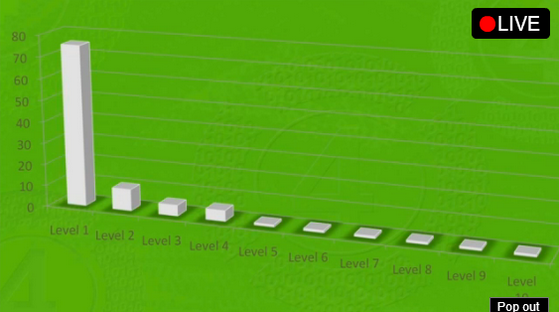Freemium games have an average lifespan of less than a year. Mobile apps keep only 25% of users after a single day, and a ghastly 2.3% average will remain after a month. Only a handful of companies have found the secret sauce to keeping players invested in their game. What do these successful games have that the others don’t?
There are big reasons why mobile games are short-lived:
- The monetization strategy is pre-packaged & has trouble adapting
- Game relies on the App Store for feedback & help
- Company spends entire budget on product development & user acquisition
Your game simply won’t succeed until you learn to conquer those mistakes.
Your Monetization Strategy Isn’t Adapatable
Every savvy app developer has an initial idea of how to monetize their freemium game. Your monetization strategy may impress on paper (who would invest time if it didn’t), but those ideas begin to fizzle once real, dynamic users come into play. Gartner found that less than .01 percent of apps will be considered a financial success through 2018. No one has a crystal ball that predicts what users will do in their app.
The first strategy you have is never the ultimate one. When developers find that out the hard way, they often fumble deciding how to move forward (and then fail). Research suggests that lack of strategy is what makes app development take long, consume resources, and falter. You need a reliable way to pivot when your monetization shows signs of failure. To decide how your users will want to spend money, why don’t you try asking them?
Monetizing doesn’t mean debuting a genius strategy. It means sculpting a refined experience over time. That is impossible to do without bringing your players into the conversation. Games today are never static products—even the most classic games take risks and change to stay profitable. You need steady communication with users to make a perfect product.
The Right Way to Get Feedback
Testing your product in the App Store will trap you in a broken feedback loop. Since users leave a bad review there when having an issue, it’s impossible to get feedback without also damaging your app’s reputation. Plenty of other people have likely read the review by the time you did. Your App Store Optimization has already been lowered before you can even act. Essentially, getting bad reviews means that it’s already too late.
(The “ratings reset” after a new build is hardly comforting. Developers like Aaron Wojnowski–whom Helpshift is hosting this February–know that their overall app rating is still affected. Users are still leaving, being chased away by complaints, or not even finding you while the latest patch is underway. How can you fund progress while bleeding users?)
So the App Store is a bad method of feedback & help. You need a good way for users to contact you directly without leaving a mar on your product. Social media is just as public. And statistically, app users don’t like to email. Spend time looking into recent in-app solutions that have hit the market. They integrate with your SDK and are affordable for beginners. Besides, diverting troubled users from the app store pays for itself.
Allowing users to reach you efficiently will help you to form a long term strategy and ultimately monetize better. While you look for the latest marketing app trends, take a moment to consider up-and-coming support platforms as well.
Plan for the Long Haul
During GamesBeat 2014, Game Development Consultant Evan Hirsch said “This is an example of a company that has a great demo and then delivers a turd.”

Many developers believe that their budget is solely for launching an impressive beta. After that, the users will fund the app within the monetization model, and good reviews will naturally come because the product is good. Those developers are wrong.
It’s a mistake to use all of your resources on initial development with hopes that you launch a perfect product or get that second funding round. That’s too unreliable. Instead, save some resources for feedback tools, crash reporting, and creating loyal users.
And the numbers don’t lie—games that stick around make far more money than any brief hit. Clash of Clans makes 60 times more each day than Flappy Bird in its prime.
Mobile app development is a lot like Who Wants to Be a Millionaire?. If you use all of your lifelines in the short term, it’s pretty easy to make a few thousand very fast. Yet if you prepare for the long road ahead, you could walk away with a million dollars. Which would you rather have?
For more industry tips on mobile app development and marketing, check out our webinar series!
This article was syndicated from Business 2 Community: Why Most Freemium Games Fail
More Technology & Innovation articles from Business 2 Community:




